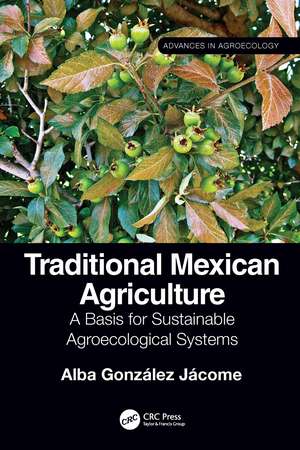Traditional Mexican Agriculture: A Basis for Sustainable Agroecological Systems: Advances in Agroecology
Autor Alba González Jácomeen Limba Engleză Hardback – 19 apr 2022
Traditional Mexican Agriculture is the result of a holistic study of Mexican agriculture. It offers the reader a perspective of traditional agriculture in Mexico from social, cultural and ecological Anthropology, Ethnology, regional and environmental History, and Agroecology, to help obtain sustainable agroecology where human societies obtain better ways of life and a healthy and nutritious food system. The book further aims to recover ideas, management, and components of local knowledge of small-scale farmers.
Pitched at university students and academics, as well as researchers and developers of agricultural matters, this book will be ideal reading at agrarian universities and related institutions. It provides a basis for future studies in sustainable agricultural systems in this region.
Din seria Advances in Agroecology
- 8%
 Preț: 473.71 lei
Preț: 473.71 lei - 9%
 Preț: 1214.91 lei
Preț: 1214.91 lei - 9%
 Preț: 593.74 lei
Preț: 593.74 lei - 9%
 Preț: 601.86 lei
Preț: 601.86 lei -
 Preț: 362.74 lei
Preț: 362.74 lei - 14%
 Preț: 338.33 lei
Preț: 338.33 lei -
 Preț: 464.81 lei
Preț: 464.81 lei - 13%
 Preț: 338.33 lei
Preț: 338.33 lei -
 Preț: 430.37 lei
Preț: 430.37 lei -
 Preț: 475.88 lei
Preț: 475.88 lei - 8%
 Preț: 389.59 lei
Preț: 389.59 lei - 18%
 Preț: 1341.51 lei
Preț: 1341.51 lei - 18%
 Preț: 796.59 lei
Preț: 796.59 lei - 18%
 Preț: 1015.82 lei
Preț: 1015.82 lei - 18%
 Preț: 790.20 lei
Preț: 790.20 lei - 28%
 Preț: 739.24 lei
Preț: 739.24 lei - 29%
 Preț: 653.93 lei
Preț: 653.93 lei
Preț: 1000.27 lei
Preț vechi: 1219.84 lei
-18% Nou
Puncte Express: 1500
Preț estimativ în valută:
191.39€ • 199.85$ • 158.05£
191.39€ • 199.85$ • 158.05£
Carte tipărită la comandă
Livrare economică 15-29 aprilie
Preluare comenzi: 021 569.72.76
Specificații
ISBN-13: 9780367462192
ISBN-10: 0367462192
Pagini: 502
Ilustrații: 6 Tables, black and white; 14 Line drawings, black and white; 136 Halftones, black and white; 150 Illustrations, black and white
Dimensiuni: 178 x 254 x 33 mm
Greutate: 0.45 kg
Ediția:1
Editura: CRC Press
Colecția CRC Press
Seria Advances in Agroecology
ISBN-10: 0367462192
Pagini: 502
Ilustrații: 6 Tables, black and white; 14 Line drawings, black and white; 136 Halftones, black and white; 150 Illustrations, black and white
Dimensiuni: 178 x 254 x 33 mm
Greutate: 0.45 kg
Ediția:1
Editura: CRC Press
Colecția CRC Press
Seria Advances in Agroecology
Public țintă
Postgraduate, Professional, Professional Practice & Development, and Undergraduate AdvancedCuprins
Foreword by Dr. Stephen R. Gliessman. Chapter 1. Introduction to Traditional Mexican Agriculture. Chapter 2 The Anthropological Concept of Traditional Agriculture. Chapter 3. Some studies Conforming Traditional Mexican Agriculture. Chapter 4 Traditional Agriculture in Mexico Part 1. Chapter 5. Traditional Agriculture in Mexico Part 2. Chapter 6 How Traditional Agriculture Has Been Studied. Chapter 7 Studies of the Origins of Agriculture in Mexico. Chapter 8 The Domesticated Maize Dispersion. Chapter 9 History, and Discussions About Homegardens in Mexico. Chapter 10 The Central Highlands, and the Homegarden. Chapter 11 The Ancient Maya Homegarden, and Its Transformations. Chapter 12 History, and Discussions About the Homegarden. Chapter 13 History, Changes, and Diversity of the Homegarden. Chapter 14 The Current Mexican Homegarden. Chapter 15 The Cornfield (milpa) in Mexico, and the Food System. Chapter 16 The Cornfield Evolution in Mexico. Chapter 17 Some Types of Cornfield in Contemporary Mexico. Chapter 18 The Cornfield, and the Food System. Chapter 19 Diversity, History, and Geography of Maize in Mexico. Chapter 20 Soil, Water, and Erosion in Mexican Traditional Agricultural Systems. Chapter 21 Nature, Ideology, and Culture in Small-scale Farmer Societies. Chapter 22 Final Considerations, and Some Conclusions.
Notă biografică
Alba González Jácome is Emeritus Professor at Universidad Iberoamericana Campus Mexico City. She is an Invited Professor at the Autonomous University of Chapingo (UACh) in the Dept. of Regional Centers, a university specialized in agrarian matters.
Descriere
This long-needed book highlights how traditional Mexican agriculture has changed according to environmental, climatic, geographical, social and cultural conditions. It provides a basis for future studies in sustainable agricultural systems in this region.
